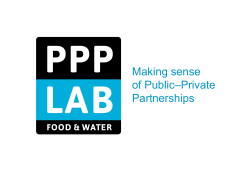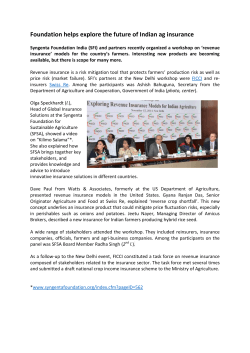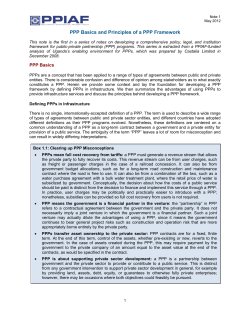
Public-private partnerships African small-holder farmers Vivienne Anthony Senior Advisor, SFSA
Public-private partnerships African small-holder farmers Vivienne Anthony Senior Advisor, SFSA Public-private partnerships: definition ● PPPs have great potential to enable small-holder farmers to improve their livelihoods but innovative approaches are key ● Combine complementary strengths of: − Public − Private − Voluntary organisations ● Produce benefits for small-holders that none can achieve alone − R&D and bringing research goods into practice − Bring input and output markets to life 2 Agriculture value chain and PPPs ● Africa > 100 PPPs ● 25% R&D-based Productivity R&D • • • • • 3 Inputs Farmers Genomic science Plant breeding Crop protection traits Nutrition improvement Fertilizer inputs Markets Collection Distribution Processing • • • • • • Wholesale Retail SABMiller Crop processing Cassava beer New markets Mozambique Seed certification Credit and loans Inputs insurance Connectivity customers/ mobile phones Challenges • Every PPP is different and has individual characteristics • Strategic vs. tactical partnerships to enable delivery • Business cases: equitable benefits and risk sharing • Financial mechanisms to support PPPs • Governance and decision-making • Intellectual property sharing • Commercialisation route to farmers • Negotiation vehicles and capacity building 4 Shifting policy and enabling environment in Africa G8 Alliance for food security and nutrition Taking innovations to scale Commitments Mobilising capital African GrowAfrica 45 66 companies governments $3.0 $3.5 billion Managing risk Investment/ Ghana Burkina Faso partnership Private sector G8 Ethiopia Mozambique Opportunities companies governments Tanzania Cote d’Ivoire Results accountability PPP platform Knowledge, contacts and tools to support PPP creation PPP database Expert contacts Case-studies Best practices Business cases Impact tools www.apxc.org Financial mechanisms Thank you for your attention
© Copyright 2025





















